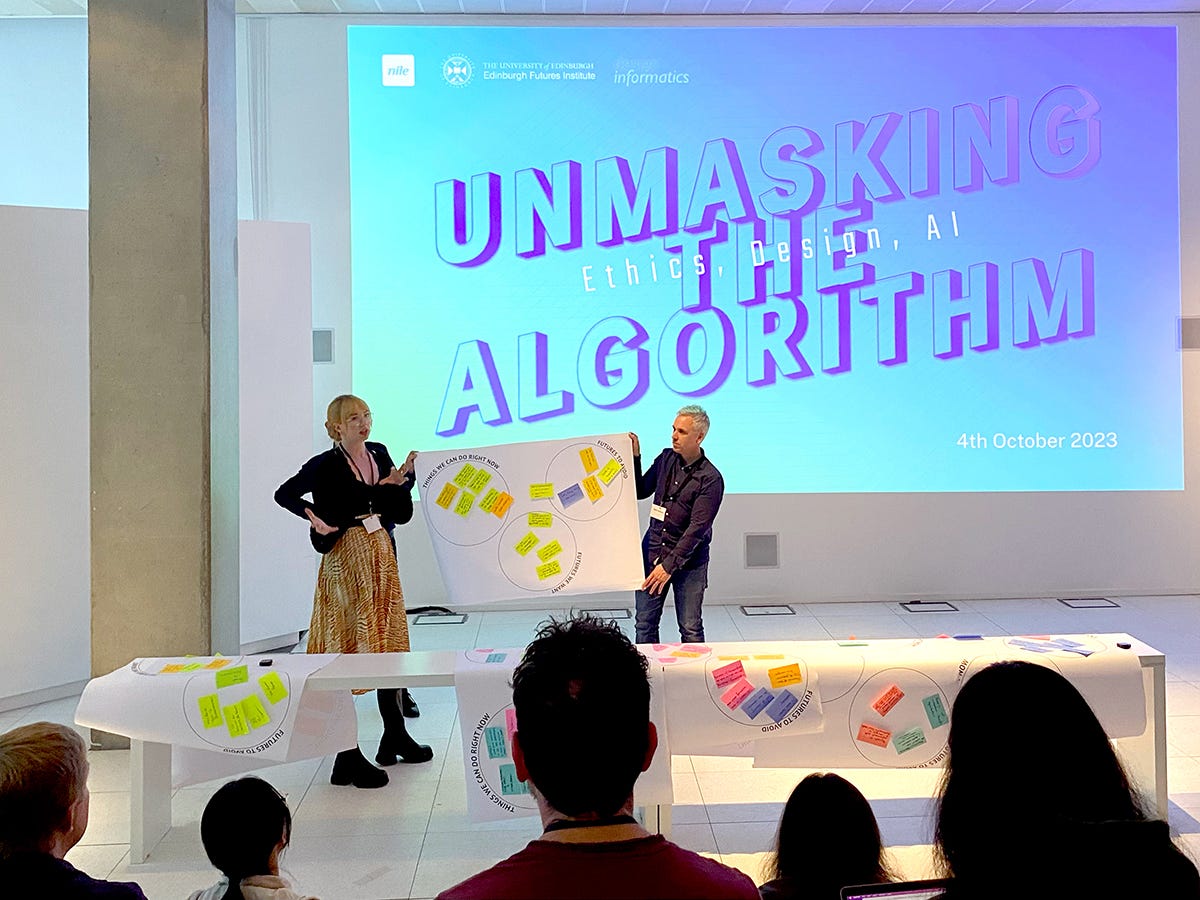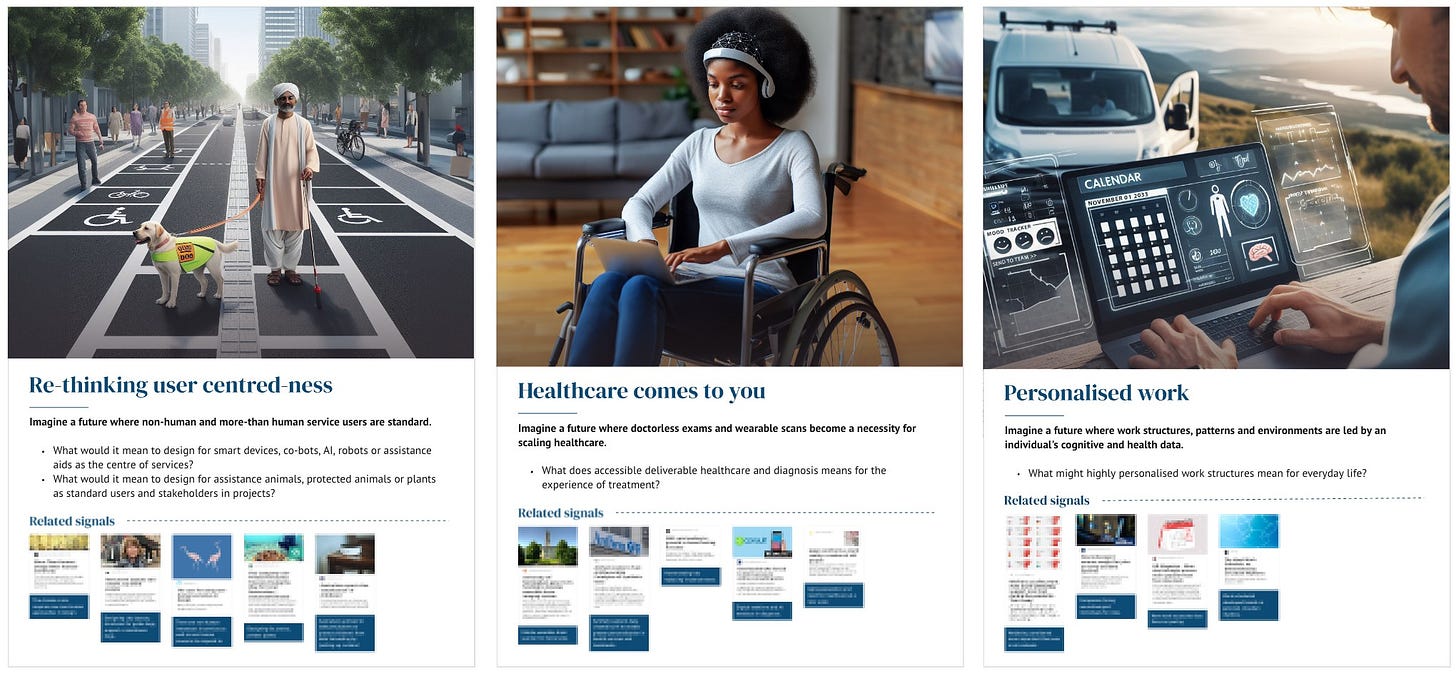Welcome to The Navigator 🧭 - a newsletter about people, technology and design for business leaders who want to make meaningful change. I’m Sarah Ronald, and I write this newsletter with the Nile team. If this email was forwarded to you, you can subscribe here to receive it straight to your inbox.
Hello! 🐵
Do you give a monkeys about getting business transformation right?
In this month’s issue of The Navigator, we’ll share a simian tale that explains why it’s a human-centred, service design approach that creates the conditions for transformation that really sticks.
Stay to the end for our Nile news round-up – including a couple of upcoming events in Edinburgh we think you’ll be interested in.
Wishing you all the best as you navigate your week,
–
Monkey business
Taking a human-centred approach to business transformation
Discussing business transformation, a friend and business partner recently shared a story with us about three monkeys: Smart, Clever and Brilliant.
One lunchtime at the zoo, the three hungry monkeys spotted a ripe bunch of bananas high up in a tree.
Smart wanted the bananas. He was great at taking an end goal, brainstorming approaches, and picking a path to get there. But although he was quick to adapt, reaching the goal was his entire focus, and he didn't think about the deeper reasons for the journey.
"Come on!" he yelled, leaping into the tree and climbing higher and higher. But as he leapt from branch to branch, his efforts to find a clear path to the top felt increasingly fruitless.
Clever wanted the bananas, too. But it often took her a long time to come up with any new approaches, instead getting caught up with optimising the ways things had been done before.
Clever sat on the ground, scratching her head, analysing every branch to determine the best series of steps to reach the fruit. Eventually, she slowly started climbing towards the prize.
Brilliant, on the other hand, had a creative spirit, a curiosity about others' needs, and a focus on outcomes.
Instead of jumping to conclusions, Brilliant thought about the goal instead - getting some lunch. Looking around, she found a long pointy stick. Poking it outside the enclosure, she carefully hooked a bunch of bananas out of the zookeeper's bag and into her hands.
By the time the other two monkeys returned with the bananas, Brilliant was already polishing off the last of hers.
The three monkeys – who happened to have worked in leading management and service design consultancies before joining the zoo – reflected on what had happened.
Clever had diligently adhered to the systematic principles of Six Sigma, while Smart swiftly adapted with Lean methodologies. Yet both were simply re-treading the old ways of working, and struggled to come up with a new approach.
Brilliant was able to step back from the problem and reframe it using a monkey-centred service design approach. This meant she could act creatively and come up with a quicker and more innovative way of reaching the desired outcome.
Rethink how you approach transformation
Just like the first two monkeys, many organisations today focus on improving or optimising what’s already in front of them, or take an analogue process and try to ‘make it digital’ - missing the opportunity to radically rethink their ways of working as part of transformation.
It might be that change is being driven by the desire for a new technology platform rather than actual human needs. Or it could be that fixed mindsets and an absence of research are blocking the path to better decision-making.
Unless you’re getting the human aspect right, your digital transformation is going to slip up sooner or later.
That's why we advocate so strongly for taking a human-centred approach to change. It’s what we like to describe as business transformation with technology.
Human-centred and creativity-driven, service design can often outshine the rigid framework adherence of Six Sigma and even the adaptive but goal-oriented nature of Agile. Every day we see evidence of the potency of empathy and innovation in identifying real business objectives and clearing the path to achieving them.
In other words, we all need to be more Brilliant.
The curiosity, empathy and human-centredness of service design puts people at the heart of transformation. It starts by deeply understanding customer needs, then engages stakeholders to determine what experiences and processes must change to meet those needs. Only then does it identify the technology solutions to enable that transformation.
The most meaningful digital transformation comes not just from implementing new tech, but from transforming with people and technology.
This leads to solutions that reflect and evolve with user needs, creating lasting positive impact and making your organisation top banana. 🍌
Nile News
Aside from delivering fantastic work for our clients, lots has happened on Planet Nile since the last newsletter... 🪐
No Harm Done?
We joined expert speakers and a super engaged audience at Unmasking the Algorithm, our first event a new series with Edinburgh Futures Institute and the Institute for Design Informatics, which we’re calling No Harm Done?. The event brought together people from academia, design and business to think about creating a future with responsible AI.
Together, we explored how we could prevent AI systems becoming decision-making ‘black boxes’, ensure people are held to account when things go wrong, and use the technology to create positive futures.
Join us at our next AI event!
Our next event, Responsible Play, takes place at Inspace, Edinburgh on Wednesday 29 November.
It's an opportunity to hear from experts and your peers on how generative AI is already impacting work in the real world.
We'll also explore the potential harms (and opportunities) this new technology affords through discussion and getting hands-on with the AI. Tickets are free but limited – book your place now.
Creating a better future with design and AI
On top of that, we’ve just heard that our colleagues at Edinburgh Futures Institute have been successful in obtaining funding to set up a Centre for Doctoral Training in responsible and trustworthy in-the-world Natural Language Processing (NLP).
Delivering events together with EFI is just the first step in a partnership we believe will deliver real impact in designing fairer futures.
Exploring the future of inclusion
We held an event at our Circus Lane HQ earlier this month in which we explored how a variety of future scenarios might impact inclusion. You can read more about the thinking behind this event in our post over on LinkedIn.
The good news is that we’re following this up with another event at our offices in Edinburgh on Wednesday 6th December. This time, we’ll be back in good ol’ 2023, looking at how we build inclusive design practices. Places are strictly limited, so reserve yours now.
RBS honoured at Scottish Financial Services Awards
We want to congratulate our longstanding clients, NatWest Group, who were recently honoured with the inaugural Chair’s Award at the Scottish Financial Services Awards, run by our partners at Scottish Financial Enterprise.
The award recognised RBS, a subsidiary of NatWest Group, and their incredible support of Ukrainian refugees. When the Ukraine crisis began, RBS quickly transformed their Edinburgh headquarters into a ‘Welcome Hub’, helping more than 24,000 newly-arrived Ukrainians. But their commitment didn’t stop there. RBS has continued creating long-term opportunities for refugees through ongoing support with housing, jobs, language learning, and more.
We’re proud to collaborate with businesses like NatWest Group who lead with empathy and remain dedicated to driving meaningful change.
That’s it for this issue - if you found this newsletter useful, please spread the word by sharing it with your friends and colleagues:
About Nile
Nile is a Strategic Design team that helps deliver human-centred change in highly regulated industries. Our methods engage employees and customers with new technology and ways of working. Our outcomes help save money and improve business performance.
If you think we can help your teams, reply directly to this email (they come straight to my inbox), or reach out to someone specific via our website.
Thanks for reading! 🚀








